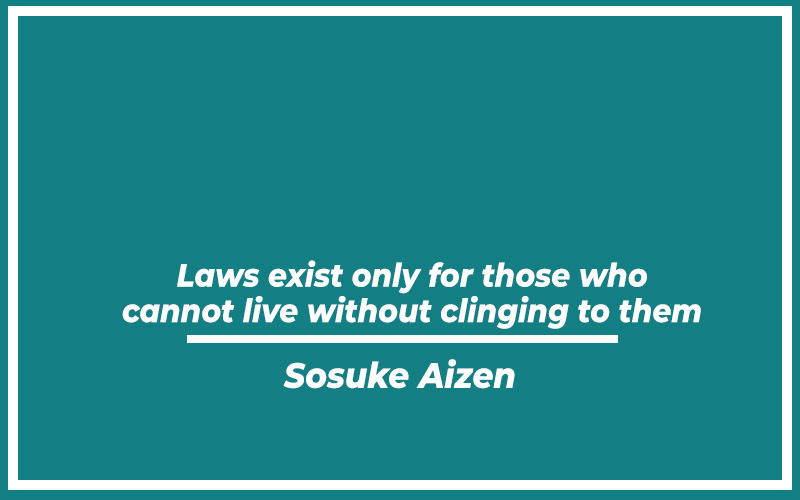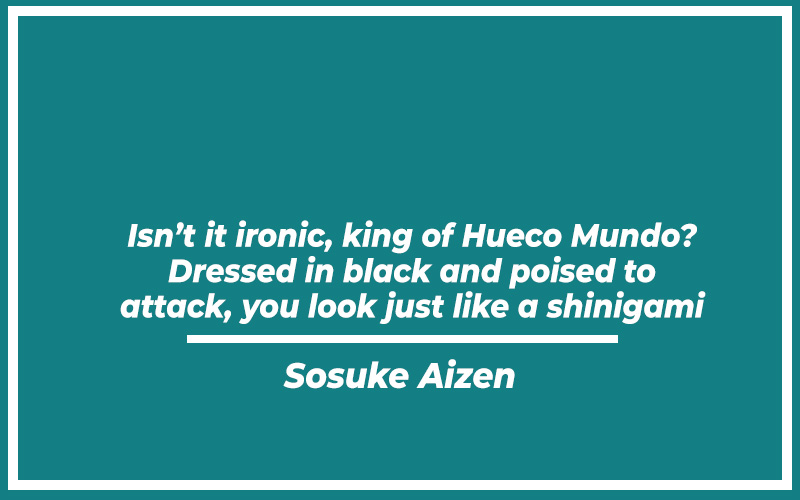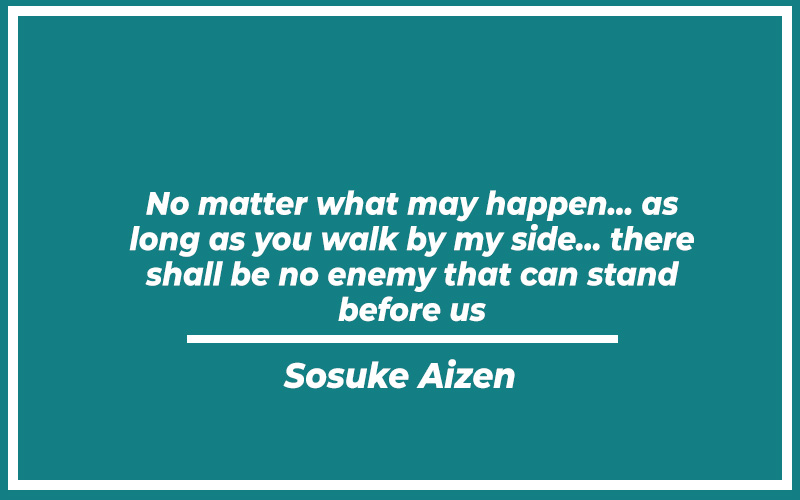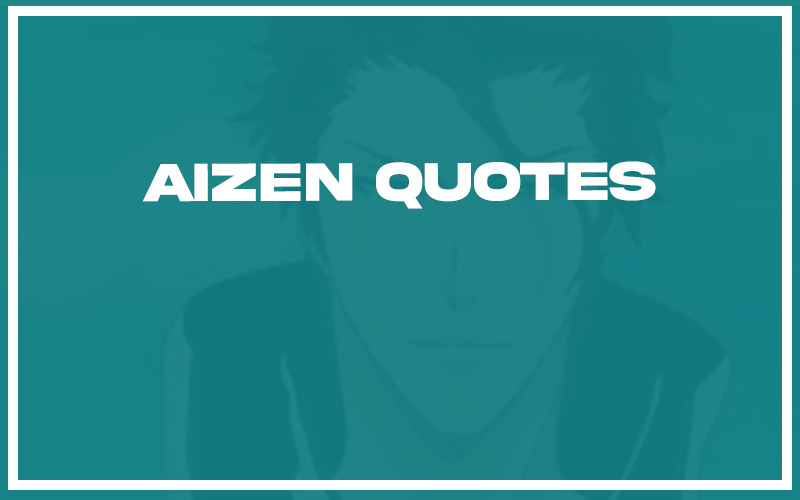When you delve into the character of Sosuke Aizen from “Bleach,” you encounter a complex villain whose quotes are as intricate as his schemes.
Aizen’s dialogue is steeped in cunning and philosophical depth, revealing his views on power, control, and destiny.
Each of his lines invites you to ponder the darker aspects of ambition and the nature of true strength. As you explore Aizen’s quotes, you’ll find they challenge your understanding of heroism and villainy, making you question the motives behind each action.
Best Aizen Quotes

“Laws exist only for those who cannot live without clinging to them.” – Sosuke Aizen
Aizen’s quote critiques the reliance on laws by those who lack self-sufficiency, suggesting that true freedom and strength come from autonomy rather than adherence to imposed rules. This perspective sees laws not as facilitators of order but as crutches for those who are unable to navigate life independently.
It encourages a view of self-governance and questions the necessity and universality of laws, promoting the idea that personal ethics and self-determination are superior to externally imposed constraints.
Also Read: Negan Quotes (with Explanation)
“Fear is necessary for evolution. The fear that one could be destroyed at any moment.” – Sosuke Aizen
Aizen posits that fear is a crucial driver of evolution, asserting that the constant threat of destruction propels individuals to adapt and improve. By framing fear as a survival mechanism rather than a weakness, he suggests that it is a natural and beneficial response to danger that stimulates growth and fortitude.
This quote emphasizes the importance of embracing fear as a motivator rather than shunning it, advocating for its role in fostering resilience and encouraging continuous development.
“Admiration is the furthest thing from understanding.” – Sosuke Aizen
This quote by Aizen distinguishes superficial admiration from deep understanding, suggesting that true comprehension of a person or concept goes beyond mere appreciation. It argues that admiration can often obscure the complexities of its subject, preventing a more profound and accurate understanding.
This perspective encourages critical engagement and deeper inquiry into the subjects we admire, promoting a more nuanced and informed appreciation that transcends initial impressions.
“Battle without hatred is like a bird without wings. You’ll never defeat anyone like that.” – Sosuke Aizen
Aizen emphasizes the necessity of passion, even hatred, in achieving victory in battle. He compares the lack of emotional drive in combat to a bird attempting to fly without wings, illustrating the ineffectiveness of dispassionate effort.
This quote highlights the role of strong emotions in driving success and the belief that significant achievements require more than just mechanical action—they need emotional investment and intensity.
“The betrayal you can see is trivial. What is truly frightening and much more lethal is the betrayal that you don’t see.” – Sosuke Aizen
Aizen points out the dangers of unseen betrayal, suggesting that the most damaging deceits are those that are not immediately apparent. This quote implies that hidden betrayals are more destructive because they allow the betrayer to manipulate and cause harm undetected, leading to potentially greater consequences.
It warns of the importance of vigilance and the need to look beyond appearances to guard against such hidden dangers.
“No matter what may happen… as long as you walk by my side… there shall be no enemy that can stand before us.” – Sosuke Aizen
In this quote, Aizen expresses confidence in overcoming any adversity as long as there is unity and loyalty. It underscores the power of solidarity and the belief that a strong partnership can conquer any challenge.
This perspective values the strength derived from alliances and suggests that combined forces, under the right leadership, are invincible.
“Reason exists for those who cannot go on living without clinging to it.” – Sosuke Aizen
Aizen critiques the dependence on rationality, suggesting that reason is a crutch for those who are unable to face life’s complexities without it. This quote challenges the supremacy of logic, promoting a view that sometimes irrationality or intuition can lead to a fuller experience of life.
It encourages embracing the unknown and the emotional aspects of human existence as valid and powerful, even when they defy rational explanation.
“Laws exist only for those who cannot live without clinging to them.” – Sosuke Aizen
Aizen’s quote challenges the intrinsic value of laws, suggesting they are for those who lack independence and are unable to navigate life without external guidance. This perspective implies that true strength and freedom come from self-governance and personal ethical standards rather than reliance on imposed rules.
It promotes the idea that personal autonomy is superior to a life constrained by laws, encouraging individuals to question the necessity of laws in their personal moral and ethical decision-making processes.
“Fear is necessary for evolution. The fear that one could be destroyed at any moment.” – Sosuke Aizen
Aizen suggests that fear is a critical driver of evolutionary change, asserting that the constant threat of destruction keeps organisms alert and ready to adapt. This view posits fear as a positive force that stimulates growth and innovation rather than a negative emotion to be avoided.
It highlights the importance of fear in ensuring continued survival and progress, portraying it not as a weakness but as a necessary condition for the development of stronger, more adaptable traits.
“Admiration is the furthest thing from understanding.” – Sosuke Aizen
Aizen critiques the superficiality of admiration, distinguishing it sharply from true understanding, which requires a deeper engagement and comprehension. This quote suggests that admiration, while potentially flattering, often lacks depth and fails to grasp the complexities of its subject.
It prompts a more thorough investigation and a critical approach to fully understand the nuances of a person or concept, beyond mere surface-level appreciation.
“Battle without hatred is like a bird without wings. You’ll never defeat anyone like that.” – Sosuke Aizen
This quote underscores the necessity of passion, even potentially negative emotions like hatred, in achieving victory. Aizen argues that emotional investment is crucial in conflict, likening the lack of it to a bird attempting to fly without wings.
This perspective suggests that true commitment to a cause involves deep emotional engagement, which fuels the drive to overcome and succeed.
“The betrayal you can see is trivial. What is truly frightening and much more lethal is the betrayal that you don’t see.” – Sosuke Aizen
Aizen emphasizes the danger of hidden betrayals over obvious ones, suggesting that the most significant threats are those that are not immediately apparent.
This quote highlights the importance of vigilance and the potential for unseen forces to cause harm, advising caution and a deeper level of awareness in relationships and alliances.
“No matter what may happen… as long as you walk by my side… there shall be no enemy that can stand before us.” – Sosuke Aizen
Aizen expresses a strong belief in the power of alliances, positing that with unity and cooperation, any challenge can be overcome.
This quote reflects his confidence in the strength derived from solidarity and loyalty, suggesting that together, individuals can face any adversary successfully.
“Reason exists for those who cannot go on living without clinging to it.” – Sosuke Aizen
Aizen challenges the supremacy of rational thought, suggesting that life can be richer and more meaningful when not confined solely to reason.
This quote encourages embracing emotional and intuitive experiences as equally valid ways of understanding the world, promoting a broader, more holistic approach to life that includes the emotional and the irrational.
“I’m going to have to ask you to stop now, Abarai-kun. I can only step on an ant so hard without crushing it.” – Sosuke Aizen
This quote reveals Aizen’s awareness of his own strength and his control over it. He metaphorically compares his power to stepping on an ant, implying that while he is capable of complete destruction, he chooses restraint.
This underscores his mastery over his abilities and his strategic use of power, highlighting a key aspect of his character: the ability to wield tremendous force with precise control, choosing not to obliterate when unnecessary, but rather to manipulate and manage situations delicately.

“Isn’t it ironic, king of Hueco Mundo? Dressed in black and poised to attack, you look just like a shinigami.” – Sosuke Aizen
Aizen uses irony to comment on the blurred lines between roles and identities, especially in conflicts. By noting the similarity in appearance between a king of Hueco Mundo and a shinigami, Aizen points out the often ironic twists in loyalties and appearances in war.
This remark reflects on the nature of war and conflict, where enemies might share more in common than they believe, and challenges the simplistic division of good versus evil, highlighting the complexity and duality of character roles in narratives.
“All creatures want to believe in something bigger than themselves. They cannot live without blind obedience. And to escape the pressure of that trust, those in whom faith is placed in turn look for someone higher than themselves. That is how all Kings are born. That is how all Gods are born.” – Sosuke Aizen
Aizen’s reflection on leadership and divinity explores the human need for belief and hierarchy. He suggests that societal structures are built on a foundational need for guidance and the comfort of a higher authority. This creates a cycle where each level of power seeks higher validation, perpetuating a hierarchy that eventually culminates in the creation of kings and gods.
Aizen’s observation provides insight into the psychological underpinnings of political and religious structures, emphasizing the role of trust and obedience in their formation.
“A victor must speak not of the current state of the world, but of how it should rightfully be.” – Sosuke Aizen
Aizen asserts that true leaders should be visionaries, not merely rulers who accept the world as it is but those who dare to envision and advocate for how it should be. This quote underscores the responsibility of victors to use their influence to shape the future, rather than simply maintaining the status quo.
It reflects Aizen’s belief in the transformative role of leadership and the importance of having a moral or ideological vision that goes beyond mere conquest.
“There is no such thing as ‘truth’ or ‘lies’ in this world; there never has been. There are only plain, hard facts. And yet, all beings who exist in this world acknowledge only those ‘facts’ that are convenient to them, and take them to be the ‘truth’.” – Sosuke Aizen
Aizen critiques the subjective nature of truth, suggesting that what people accept as truth is often just a reflection of what is convenient for them to believe. He challenges the notion of an absolute reality, promoting a view that recognizes the manipulative potential of perceived truths and the power dynamics involved in their acceptance or rejection.
This perspective calls for a critical examination of the ‘facts’ one accepts, encouraging a deeper understanding of how personal biases and societal influences shape one’s perception of reality.
“Admiration is the furthest thing from understanding.” – Sosuke Aizen
This quote reiterates Aizen’s belief that true understanding requires a deeper engagement than simple admiration. Admiration, while potentially flattering, can often be superficial and does not necessarily entail a profound comprehension of the admired subject.
This distinction prompts a deeper investigation and a critical approach to fully grasp the complexities of a concept or individual, advocating for a more substantive and nuanced understanding beyond initial impressions.
“Fear is necessary for evolution. The fear that could be destroyed at any moment.” – Sosuke Aizen
Aizen once again emphasizes the role of fear as a driving force for survival and innovation. By suggesting that the constant threat of annihilation propels beings to adapt and improve, he frames fear as a fundamental component of evolutionary progress.
This perspective views fear not as a weakness but as a crucial motivator in the pursuit of growth and resilience, advocating for its acceptance as a natural and beneficial force in the development and survival of species.
“All creatures want to believe in something bigger than themselves. They cannot live without blind obedience. And to escape the pressure of that trust, those in whom faith is placed in turn look for someone higher than themselves. That is how all Kings are born. That is how all Gods are born.” – Sosuke Aizen
Aizen’s quote delves into the human condition and societal structures, suggesting that the need to believe in something greater than oneself drives the creation of hierarchical systems like monarchies and religions. He implies that this need stems from a fundamental desire for guidance and assurance, which in turn perpetuates a cycle of dependence and authority.
This belief system not only supports the existence of rulers and deities but also justifies the continued search for higher powers, reflecting on the psychological and social mechanisms that underpin human civilization and its governance.
“The difference between reality and illusion is vague, but it is those who can distinguish between the two who truly possess power.” – Sosuke Aizen
Aizen’s commentary on reality versus illusion explores the concept of perception as power. He suggests that the ability to discern truth from falsehood is not just an intellectual exercise but a form of control.
This perspective underlines the strategic advantage in understanding and manipulating perceptions—central to Aizen’s character—as those who master this can manipulate not only situations but also people. It’s a reflection on the broader implications of power dynamics where control over one’s own and others’ perceptions constitutes real authority.
“True villains are those who embrace darkness without hesitation, for they understand the true nature of power.” – Sosuke Aizen
This quote provides insight into Aizen’s belief system, where he associates true power with the acceptance and utilization of one’s darker impulses without remorse. He posits that moral constraints are limitations to achieving ultimate power, advocating for a path that fully embraces all aspects of one’s abilities and desires, regardless of ethical considerations.
This perspective not only highlights his villainous philosophy but also challenges conventional moral dichotomies, suggesting that power and progress sometimes require stepping beyond traditional ethical boundaries.
“It’s very difficult for me to step on an ant without crushing it.” – Sosuke Aizen
Aizen uses this metaphor to express the challenges of exerting great power without causing unintended harm. It reflects his awareness of the destructive potential of his strength and his deliberate efforts to control it.
This quote speaks to the broader theme of responsibility that comes with power, highlighting the delicate balance required to manage significant capabilities thoughtfully and effectively. It underscores the idea that true strength lies not just in power itself but in the ability to wield it judiciously.
“I had no intention of deceiving anyone. It’s just that none of you could understand…my true self.” – Sosuke Aizen
Aizen’s statement addresses the loneliness and isolation that often accompany being misunderstood or misrepresented. He suggests that his actions and words were not meant to deceive but were responses to the incapacity of others to comprehend his complexities.
This quote touches on themes of identity and perception, reflecting the difficulties in truly knowing someone, especially those with complicated or hidden depths. It invites consideration of how misunderstandings can lead to conflict and the challenges inherent in communicating one’s true intentions.
“Don’t use such strong words. It’ll only make you look weak.” – Sosuke Aizen
Here, Aizen advises against the overt display of aggression or assertiveness, suggesting that such behavior can reveal insecurities rather than strength. He promotes a philosophy of composure and subtlety in communication, implying that real power is demonstrated through confidence and control rather than loud declarations.
This advice reflects his manipulative and strategic character, emphasizing the effectiveness of a calm and measured approach over forceful or emotional reactions.

“No matter what may happen… as long as you walk by my side… there shall be no enemy that can stand before us.” – Sosuke Aizen
Aizen expresses a confident assurance in the power of alliances, asserting that with loyalty and cooperation, no challenge is insurmountable. This quote highlights his belief in the strength that comes from unity and collective effort, emphasizing the strategic advantage of forming and maintaining strong bonds.
It underscores the importance he places on loyalty and the mutual reinforcement found in partnerships, reflecting his tactical approach to overcoming obstacles and defeating adversaries.
Also Read: Tuesdays with Morrie Quotes (with Explanations)
Final Thoughts
Aizen quotes linger in your mind long after you’ve encountered them, echoing the sophistication and chilling foresight of his character. They serve as a stark reminder of the thin lines between genius and madness, vision and delusion.
Let his words motivate you to think critically about the power dynamics at play in your own world and the impacts of leadership and manipulation.
Aizen, as a character, may embody the role of a villain, but his insights can provoke a deeper understanding of human nature and the seductive allure of unchecked ambition.

